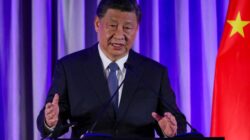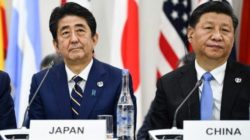WASHINGTON: As concerns grow about US House Speaker Nancy Pelosi’s planned visit to Chinese-claimed Taiwan, US President Joe Biden and China’s Xi Jinping may conduct their sixth call as leaders as soon as today.
According to White House officials, the long-planned call would cover a wide range of topics, including Russia’s invasion of Ukraine, which China has yet to denounce.
At its core, US officials see the exchange as another opportunity to manage competitiveness between the world’s two largest economies, whose ties are becoming increasingly tainted by tensions over democratically controlled Taiwan, which Xi has sworn to reunite with the mainland, by force if necessary.
Beijing has issued growing warnings about the consequences of Pelosi’s visit to Taiwan, which would be a significant, if not unprecedented, show of US support for the island, which claims to be under rising Chinese military and economic threats.
Washington has no official connections with Taiwan and adheres to a “one-China” policy that acknowledges Beijing rather than Taipei internationally. However, it is required by US law to provide the island with the means to defend itself, and pressure in Congress has been mounting for more explicit support.
“This is about keeping the lines of communication open with the president of China, which is one of the most consequential bilateral relationships we have, not just in that region, but around the world, because it touches so many things,” White House national security spokesman John Kirby told reporters on Wednesday.
According to one source briefed on the call’s preparations, the Biden administration believes that leader-to-leader dialogue is the best way to reduce tensions over Taiwan.
Some observers say Xi is interested in avoiding a severe confrontation with the US as he seeks an unprecedented third term in office at a session of China’s ruling Communist Party in October or November.
According to the source briefed, Biden also wants to discuss climate and economic competition issues, as well as the concept of putting a price restriction on Russian oil to penalize Moscow for its war in Ukraine, which Treasury Secretary Janet Yellen raised with Chinese counterparts earlier in July.
The Biden administration has been contemplating whether to reduce tariffs on Chinese imports in order to reduce surging inflation, but US officials have stated that no decision is expected before the call.
When Biden last met with Xi in March, he threatened “consequences” if Beijing provided material support for Russia’s conflict, and the US government believes that line has not been crossed in the months since.
Despite talk of a prospective trip by Pelosi, which the speaker has yet to announce, the White House has restated its “one-China” stance.
The last time a speaker of the US House of Representatives visited Taiwan was in 1997, and the US administration has minimal control over legislative travel as a co-equal arm of government.
Since then, China has grown more powerful militarily and economically, and some analysts fear that such a visit at a time when relations are strained may spark a crisis across the 160km-wide Taiwan Strait waterway that separates China and Taiwan.
“The relationship is in such a bad way. Mutual suspicion is at an all-time high. “I believe people are underestimating how serious the current situation is,” said Bonnie Glaser, a China expert with the German Marshall Fund of the United States.
She suggested that Biden and Xi focus their call on de-escalation, including potential procedures to lessen the danger of mistakes.
Kirby said the administration has been in contact with Pelosi’s office to ensure she gets “all the context” she needs to make travel decisions.
China has provided few hints as to what exact steps it would take if Pelosi, a long-time critic of China, notably on human rights problems, visits Taiwan.
Playing up the Taiwan issue, according to Martin Chorzempa, a senior research fellow at the Peterson Institute for International Economics, could serve Xi as a domestic distraction from China’s slowing economy, but “any reaction strong enough to trigger US sanctions would cause massive damage to China and the world economy.”
Source: Reuters








